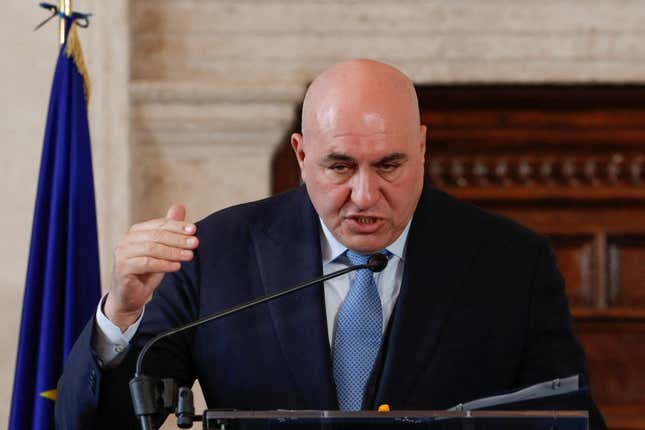
The Italian government has some strong words of regret about its decision to join China’s transcontinental development project, the Belt and Road Initiative (BRI).
Signing up for Beijing’s flagship infrastructure and foreign policy effort was an “improvised and heinous act” by the previous administration, Rome’s defense minister Guido Crosetto said in an interview with Italian newspaper Corriere della Sera on Sunday (July 30). The BRI, launched in 2013 by Chinese leader Xi Jinping, aims to spearhead China-led development projects around the world.
Crosetto said that being part of the BRI “led to a double negative result”: China’s exports to Italy surged, while Italian exports to China lagged behind those of other countries not in the BRI.
“The most ridiculous thing at the time was that Paris sold planes to Beijing for tens of billions without signing any treaty,” Crosetto said. He added that the focus now is on how to walk back the BRI “without damaging relations” with China, which is both “a competitor” and “a partner.”
China–Italy ties fall from “unprecedented...heights”
Italy signed on to the BRI in 2019, the first major European economy to do so. At the time, Chinese media celebrated the deal (link in Chinese) as raising China–Italy relations “to unprecedented new heights.”
The agreement came at a time when Italians’ perception of China seemed to be ascendent: a year after it was inked, survey results from the Pew Research Center showed that respondents in Italy had switched to seeing China and not the US as the world’s leading economic power in 2020. Italy, which has Europe’s third-largest Chinese population after the UK and France, remains the only country among the two dozen polled by Pew that regards China as the top economic player.
Four years on, though, relations between Rome and Beijing have soured.
For months, Italy has indicated that it’s having second thoughts about the BRI. Last year, while on the campaign trail, now–prime minister Giorgia Meloni called the decision to join it a “big mistake.”
And in May, Meloni said that it’s “possible to have good relations....with Beijing, without necessarily these being part of an overall strategic design.” She also acknowledged that deliberations on whether to ditch the Chinese project were “very delicate.” Rome is now expected to make a final decision on its BRI membership in December.
Beyond geopolitics, the BRI left Italy with the short end of the stick. George Magnus, an economist and a research associate at Oxford University’s China Centre, called it a “classic case of oranges and lemons.”
“Italy sold China more oranges, but ended up as lemons as Chinese exports almost doubled,” Magnus wrote.